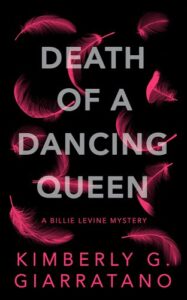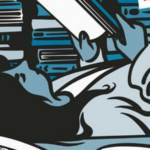New Jersey has my heart, even if I don’t live there anymore. You can blame the exorbitant property taxes for that. Like most Jewish kids from my town, I was born in New York City, but raised in its shadow. I grew up in a sprawling suburb of massive subdivisions and mini-malls; of traffic along the Route 9 corridor; and of new synagogues and old churches. My high school had two thousand students in it and was within walking distance to Old Tennent Cemetery where descendants of witch-hunter Cotton Mather are entombed. The mall is still only a five-minute drive from there. On the way to Nordstroms, you’ll pass Monmouth Battlefield where Molly Pitcher supposedly took her husband’s place during the Revolutionary War.
For college, I moved 45 minutes west, a circumstance of cheap in-state tuition. This is where I truly learned the biases of state geography after constantly having to explain to my Jersey brethren that Central Jersey does exist; and no, it is not part of South Jersey. Do not mix me up with anything below Exit 7A on the NJ Turnpike.
I often explain to outsiders, particularly those who have only experienced the state via Newark Liberty Airport, that New Jersey is geographically diverse. There’s a coastline of boardwalks and warm water that we lovingly refer to as the shore. We have ski slopes in the northwest, farms in the south. We grow delicious blueberries. There’s Wildwood and Cape May. Lambertville is so quaint, you’d think you’re on a movie set. But New Jersey is also industrial. The stench off Exit 13A is legendary, a mix of natural gas and garbage fumes that are as familiar as they are appalling.
Also there’s a reason Lady Liberty faces New Jersey. Nearly 20 percent of the state’s population was born in other countries. The northern part of Hudson County was nicknamed ‘Havana on the Hudson’ because of its large Cuban settlement. Newark is where you head for choice Iberian food, but is now home to Ecuadorian immigrants. And Middlesex County has the largest Asian population in the state, at over 200,000 people. When I taught in Clifton, we had three bilingual programs — Spanish, Arabic, and Polish. When you come to New Jersey, you come to the world.
So it only makes sense that Garden State crime fiction will be a heterogenous mass of Soprano-style noir and thrillers as tense as the traffic heading into the Lincoln Tunnel. If you can’t visit the state, read these books instead for an experience that you won’t fogettabout.

Suburban Dicks by Fabian Nicieza
The Self-Made Widow by Fabian Nicieza
Fabian Nicieza, a co-creator of the comic superhero Deadpool, explores race and suburban drudgery in hilarious fashion. Set in the real towns of West Windsor-Plainsboro, Suburban Dicks centers on Andie Stern, a very pregnant housewife who once had dreams of joining the FBI, and Kenny Lee, a disgraced reporter who is still hanging his laurels on an old expose he wrote about the former governor. Together, they tackle the death of a local gas station attendant, a young immigrant, and upend the entire community when an old murder comes to light. Nicieza does a masterful exploration of racial tensions between the long-time residents of, what was once, an agrarian town and the ethnic enclave of the Pakistani-Indian community that has settled there. Kenny brings the snark, but Andie is the real heroine as she is obviously the smartest person in the room; the only thing holding her back is herself.
In The Self-Made Widow, Andie questions the death of her friend’s husband and alienates her mom group in the process, while Kenny must deal with his new-found fame. In this follow-up, Nicieza picks at marital monotony, taking particular aim at motherhood and career loss, which he nails on the head.
Neither book is to be missed.

When One Man Dies by Dave White
Former cop and recovering drug addict Jackson Donne turns to private investigation to pay the bills. When his friend, an old-timer, is killed in a hit-and-run outside a New Brunswick bar, Donne takes the case. He also gets hired by a woman to tail her unfaithful husband in Morristown. As Donne drives up and down Route 287, he is being sidelined by his shady ex-partner, Bill Martin. Jackson Donne is a chip off Philip Marlowe, complete with drinking problem, lady trouble, and run-ins with the law. When One Man Dies was originally published in 2007, so Donne is often using Mapquest for directions or circling streets until he finds his mark — very nostalgic. The second book takes place seven years later so life will surely change for Donne. This is a superb series for Raymond Chandler fans looking for an East Coast contemporary.

By Way of Sorrow by Robyn Gigl
It’s 2006 and Erin McCabe, a New Jersey defense attorney and transwoman, takes on the case of Sharise Barnes, another transwoman and sex worker, accused of killing a young man in a South Jersey motel. Erin and her legal partner plan to argue the murder was done in self-defense, but Sharise’s story doesn’t add up. Further complicating the case is the victim, who is the son of a powerful New Jersey politician. Gigl, an attorney who has worked tirelessly with the LGBTQ+ community, has penned a pitch-perfect legal thriller that exposes the blatant discrimination faced by the trans community in a time when gender identity was not widely accepted nor understood. Erin must school prosecutors and judges on pronoun usage and gender dysphoria while also having to contend with her estranged family members and a vicious New Jersey press who has outed her trans status to the world. For modern readers, those outdated beliefs and misconceptions will feel like another century rather than 16 years ago, which serves up how far we have come, but also how far we still have to go in response to anti-trains laws popping up in state legislatures. The second book, Survivor’s Guilt, is also available, so if you love a tightly-plotted legal thriller with dynamic characters, embark on the series so Gigl has reason to write more.

Line of Sight by James Queally
Ever since getting sacked from his newspaper job, Russell Avery has been working on behalf of Newark’s less-than-finest police officers, getting them out the scrapes they manage to find themselves in — such as stealing seven grand from a crime scene. It’s not noble work, and Russell knows it, but he needs to pay the bills somehow. When his friend, a social justice activist, asks him to look into the police shooting of a low-level drug dealer, Russell is hesitant to get involved. After all, the Newark PD isn’t anyone he wants to get on the wrong side of, especially when the police chief threatens to pull Russell’s private investigator license. That only means there is something to expose. Eventually, Russell begins investigating the shooting deaths of two Black and Latino teenagers, setting off a domino of events that include riots, protests, and violence. Can Russell stop his beloved Newark from going up in flames? Like all great hard-boiled heroes, Russell gets thrown out of bars, beaten up, and tailed as he attempts to make sense of two senseless deaths. Action-packed, Line of Sight is gritty and poignant as it explores the hazy space of policing and abuse of power in a beleaguered Newark. As Russell explains to his cop buddy, “This isn’t cops and robbers. There’s some truth to your anger and some truth to theirs.” Author James Queally, a crime reporter in California, once covered crime and police for the Star-Ledger in New Jersey. His experience doesn’t just lend authenticity to Russell Avery, but Queally’s journalist background means the narrative is tightly paced and efficiently-written. Every sentence is meaty and lean, with a bit of wry humor. There’s a second book, All These Ashes, to read next, and you will want to.

Please See Us by Caitlin Mullen
A serial killer is targeting vulnerable women in a washed-up, dejected Atlantic City. Meanwhile two women with their own traumas meet under weird circumstances. Ava, a teenage psychic who goes by the name Clara Voyant, is having scary visions of missing local women. She elicits help from Lily, a former art gallery worker, who is moonlighting at a hotel spa while she tries to get her life back on track. The girls have nothing in common except an inexplicable reason to trust each other, and they need to because the killer has found them. Tightly-paced with rip-roaring suspense, Please See Us is more than a psychological thriller; it is a treatise on the vicious cycle of poverty and drug addiction in an economically depressed city. Atlantic City is the perfect metaphor since it too has fallen hard and fast; the glamour of yesteryear rubbed off like last night’s makeup. Even Clara’s drug-addled aunt encourages Clara to pursue sex work to pay the rent. And when Lily’s boyfriend publicly humiliates her, she is forced to leave Manhattan and return home, working a minimum-wage job. If not for her mother, Lily would be out of options. And that is what Mullen deftly explores—the abuse of women and society’s apathetic response. As Ruth Bader Ginsburg famous said, “I ask no favor for my sex. All I ask of our brethren is that they take their feet off our necks.”
***


















